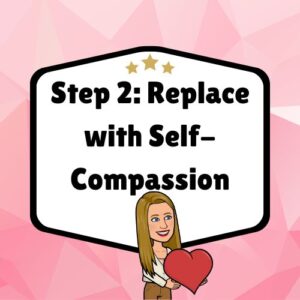© - Content and images in this blog are copyright Katherine Beasley unless stated otherwise. Feel free to repost or share images for non-commercial purpose, but please make sure to link back to this website and its original post.
℗ - We do not store any information about your visit to our website other than for analytics and optimization for content and reading experience through the use of cookies.
℅ - Our site does at times contain paid advertisements, sponsored content, and/or affiliate links.
Walking Affirmations MP3
download
Download the free walking affirmations mp3 audio!
free resources
I'm on a mission to help ambitious women who feel trapped in their body weight have a successful weight loss journey.
I'm Katherine
Welcome to the Blog

Imagine embarking on a journey to better health, only to find every step overshadowed by a nagging sense of guilt and shame. For many, this is the reality of weight loss in a world steeped in weight stigma and internalized weight bias. Instead of celebrating progress, we punish ourselves for perceived failures, turning healthy choices into burdensome obligations. What if the key to lasting change isn’t just in what we do, but in how we think about ourselves? It’s time to let go of the toxic narratives and reclaim a positive, self-compassionate path to wellness.
Understanding Weight Stigma

Several years ago, when I was still very heavy, some research I accidentally stumbled upon transfixed my attention. I found it while reading medical abstracts about weight, which was a common activity for me. As always, I was looking for a quick fix or an explanation. I wanted to be exonerated and put all the blame on some genetic flaw of my metabolism.
I don’t recall what search terms I had typed in, but my search turned up articles about “obesity stigma.” These articles just about broke my heart. It was heart-rending for me how accurately they portrayed the harshly negative view our society takes of excess body weight. The articles resonated one-thousand percent with my lived experiences. They made me confront society’s weight stigma and all the pain it had injected into my life. Weight stigma refers to the harsh judgments and negative treatment that heavier individuals face, and they are deeply embedded in societal attitudes.
Weight Stigma Among Children
One of the articles included a summary of a hauntingly poignant research study that dated back to the 1950’s. I didn’t keep a copy of that article, but here’s a similar summary from a more recent article on the same topic:
A Classic 1950s Study on Weight Stigma:

“In a classic study performed in the late 1950s, 10- and 11-year-olds were shown six images of children and asked to rank them in the order of which child they ‘liked best’. The six images included a ‘normal’ weight child, an ‘obese’ child, a child in a wheelchair, one with crutches and a leg brace, one with a missing hand, and another with a facial disfigurement. Across six samples of varying social, economic, and racial/ethnic backgrounds from across the United States, the child with obesity was ranked last. In the decades since, body weight stigma has spread and deepened globally.“
Source: “How and why weight stigma drives the obesity ‘epidemic’ and harms health” (August 15, 2018)
Sources of Weight Stigma

The articles also highlighted the numerous ways in which heavier people are judged and mistreated. Some examples include bullying, negative media portrayals, and negative attitudes from health care professionals. One that really resonated with me is the type of negative comment that masquerades as friendly, such as jokey comments from friends and family members who mistakenly think that their teasing will help “motivate” you to lose weight.
According to the experts, nothing could be further from the truth. Here’s a quote from the same 2018 article I referenced before that illustrates this truth:
What Researchers Say About Weight Stigma and Motivation:

“Common wisdom and certain medical ethicists assert that stigmatizing higher-weight individuals and applying social pressure to incite weight loss improves population health. We argue the opposite. The latest science indicates that weight stigma can trigger physiological and behavioral changes linked to poor metabolic health and increased weight gain. In laboratory experiments, when study participants are manipulated to experience weight stigma, their eating increases, their self-regulation decreases, and their cortisol (an obesogenic hormone) levels are higher relative to controls, particularly among those who are or perceive themselves to be overweight. Additionally, survey data reveal that experiences with weight stigma correlate with avoidance of exercise. The long-term consequences of weight stigma for weight gain […] have also been found in large longitudinal studies of adults and children, wherein self-reported experiences with weight stigma predicted future weight gain and risk of having an ‘obese’ BMI, independent of baseline BMI.“
Source: “How and why weight stigma drives the obesity ‘epidemic’ and harms health” (August 15, 2018)
The basic story here is that weight stigma actually leads to increased weight gain, not weight loss. What a painful, senseless, and harmful thing to inflict upon fellow human beings.
Understanding Internalized Weight Bias
As I read these articles, so many things gelled in my brain. To be honest, I felt angry. All this objective, scientific evidence showed how unreasonable and judgmental the world is to people like me. But something struck me even more deeply. That was realizing how much of this stigma I had turned inward, something known as internalized weight bias.

Because it turns out that there is something even worse, even more harmful, and even more devastating than weight stigma. That’s the feelings of guilt, shame, and self-loathing heavy people, myself included, have against ourselves due to our weight. After all, the same society that gave rise to weight stigma is the same society where we all grew up.
We’ve all involuntarily learned the same myths and biases about body weight. It’s impossible to grow up in our society and escape those. It’s just that, in our case, they were all turned against us, even in our own minds. This is a highly prevalent but often ignored phenomenon. In my experience, it is the number one obstacle to lasting success with weight loss.
Why Willpower is Not Enough
Once you think about it, the importance of internalized stigma is obvious really. If a given activity or behavior makes you feel guilty or ashamed – or if it merely reinforces those feelings within you – how long will you be able to continue making yourself do it? You can willpower your way through it for a while, but would it ever become a way of life? I think this is the big secret behind the vicious pattern of yo-yo dieting. People can initially be successful through brute willpower, but that won’t keep it off.
So here’s the huge take-away: You don’t stick to your weight-loss plans through willpower, but through finding joy in them. That means creating a whole new relationship with your body, exercise, and food.

Identifying and Eliminating Myths About Body Weight
So the question becomes: How do you do that? How do you find joy in your weight-loss plans? The basic idea is to identify the myths you unconsciously hold about body weight and then eliminate them. Identifying them is usually pretty easy once you get started, but eliminating them takes longer because they’re so ingrained.
The indoctrination with weight myths begins from a young age. Many messages, both overt and covert, form our internalized weight bias. Most of these are unscientific misconceptions, but they are rarely examined, questioned, or challenged.
Here is a Partial List of Myths About Body Weight:

- “If someone is heavy, it shows that they aren’t very smart.”
- “Heavier people are lazy and irresponsible. They lack willpower and self-discipline.”
- “Heavy people are not very good with personal hygiene.”
- “If you weigh more than average, it’s ‘your fault’ because you’ve made poor choices about your lifestyle. You’ve ‘done that’ to yourself.”
- “Heavy people are less capable of achieving success in life. There’s just something wrong with them.”
- “Losing weight is simple and just requires willpower. If you’re heavy, you either don’t have willpower or are too lazy to use it.”
Reflection Moment: What Has Shaped Your Mindset?
The examples in the list above are just some examples. I’m sure you’ll come up with more once you start exploring this idea. It may also be helpful to examine some of the incidents in your own life. What might have contributed to your development of internalized weight bias? Try thinking about your childhood and adolescence. What attitude toward body weight prevailed in your family? At your school? Among your friends?
Even seemingly helpful comments can contribute to internalized weight bias. An example would be a parent who says things like, “Don’t eat too many cookies – you don’t want to get fat, do you?” (A more scientifically accurate thing to say would be, “Let’s enjoy these cookies, but remember it’s important to have a balanced diet so we feel good and stay healthy.”)

The Antidote for Internalized Weight Bias: Self-Compassion
Why is it important to learn about weight bias and these unrecognized myths about body weight? In my experience, these are topics that are seldom spoken of but carry a huge impact. I believe anyone can temporarily lose weight using strategies that are common-sense and widely known, such as exercising and eating healthily. But keeping the weight off is another matter all together, and it requires skills and knowledge that are not very obvious or intuitive. Understanding weight bias and deactivating it is the most crucial one.
And it turns out I am not alone in this belief. According to many weight researchers, these psychological factors are crucially important for weight loss, especially weight management. Dr. Charlotte Hagerman, a weight researcher at Drexel University, summed things up nicely in a 2024 interview on the university’s website:
What Researchers Say About Self-Compassion:

“Hagerman noted that weight loss and maintenance are extremely difficult, and people typically blame themselves for a lack of willpower. ‘In reality, we live in a food environment that has set everyone up to fail. Practicing self-compassion rather than self-criticism is a key strategy for fostering resilience during the difficult process of weight loss,’ said Hagerman. ‘The next time you feel the urge to criticize yourself for your eating behavior, instead try speaking to yourself with the kindness that you would speak to a friend or loved one.‘”
Source: “Can Practicing Self-Compassion Help People Achieve Weight Loss Goals?” (Jan. 25, 2024)
My Opinion on All This
Hagerman’s words mesh exactly with my own lived experience. I would not be a size 2 today if I had not become an out-and-out self-compassion Ninja ten years ago! I credit this one thing with the majority of my weight loss success. It’s the one thing that makes me feel secure in my new weight, without having to worry like I used to about relapsing.
Implementation Part 1: Identify Negative Beliefs

Hopefully I’ve convinced you how important this is, so let me give you some concrete examples. That way you can understand what this looks like in real life and how you can implement it in yours.
Step one is, while exercising or eating healthily, be on the lookout for negative or judgmental attitudes. For example, a negative thought that plagued me early on in my weight loss efforts was that my sweat and discomfort during exercise were indictments, accusations aimed at myself.
I kept having involuntary negative thoughts that went something like this: “If I hadn’t let myself get so out of shape, I wouldn’t be struggling with this. I should be able to walk further and faster than this before I get all out of breath! This just shows how lazy I’ve been.”
Implementation Part 2: Self-Compassion
Once you identify a negative belief, counter-attack with self-compassion!
When I think of self-compassion, I think of the idea of treating myself with the same compassion that I would give to another person (especially someone I love, like my child) – somebody who just happened to find themselves in the same circumstance that I am in. This has been very powerful for me in overcoming internalized weight bias.

Visualize a Loved One
Let me walk you through an example. I would imagine to myself that my child (or someone else I loved unconditionally) was in the same boat as me. I imagined they had gained weight and were out walking as part of a weight loss effort. How would I feel when I saw them pushing themselves to the point of getting sweaty, tired, and achy? Would I be disgusted with how lazy they’d been?
Visualize Your Compassionate Response
Of course not that’s not how I would feel! I would be BEYOND PROUD of them. You’d see me cheering them on like crazy from the sidelines! I would be saying how they wound up in the situation was unimportant, and what is important is what they do now.
I would be telling them things like, “Everyone has problems and challenges in their life, but not everyone has the inner strength to do anything about it. You’re a champion for stepping up to the challenge and taking action! If you keep on like this, you’ll have amazing success.”
Apply the Same Compassion to Yourself
The question is: If your child deserves that sort of compassion and encouragement, why don’t you deserve the same? The feelings that you would extend towards your child in this situation are the same feelings you should extend towards yourself.
More Examples of Replacing Internalized Weight Bias with Self-Compassion
Here are some other examples, taken either from my own weight loss experience or those of others I’ve helped:

- “Why bother going to the gym? Everyone will stare at me and think it’s ridiculous for someone my size to even try working out. And maybe it IS ridiculous. Maybe there’s no hope for me.“
- “I don’t think this will work. If I had the willpower to lose weight, I wouldn’t have gotten fat in the first place. I should just give up.”
- “Normal people don’t have to eat like this. The way I have to eat to lose weight is like a big blinking red light that tells the world about all the unhealthy choices I’ve made in the past. Trying to lose weight now is just too little, too late.”
- “What’s the point of exercising? Even if I lose weight, I’ll never look like those fit people I see on TV and social media. I’ll always be the odd one out.”
The exact type of negative thoughts that any given person experiences will naturally vary on an individual basis. The key is to be aware of them – be on the lookout for them. Adopt a mindset that any time you are feeling negative about your healthy lifestyle changes, there’s probably an underlying cognitive distortion like those listed above. You might have to be very thoughtful and reflective to be able to pinpoint it.
Once you do, the strategy is the same. Discover the alternative, compassionate view that you would give to someone else. Then be intentional about giving yourself the same thing. Here are some practical ideas for how to implement that.

 Once you’ve identified a negative belief that is affecting your weight loss journey, decide what the suitable replacement is and turn it into a positive affirmation. For example, if your original belief is, “This sweat just shows how out of shape I am,” you can replace that with something like this: “This sweat is a badge of honor that shows I am being virtuous by taking my exercise seriously and pushing myself out of my comfort zone.” Read or repeat the affirmations daily, especially when encountering the situation that gives rise to the negative thought. |  Journaling allows you to process emotions and track progress. For eliminating negative beliefs, I recommend starting off by articulating the negative feelings you’ve identified, then writing in detail about the new mindset you wish to replace them with. You can also write about your challenges and victories, and reflect on your journey. |
 Visualization can help you imagine success and feel more positive about your efforts. I like to visualize myself while I am exercising, choosing to see myself in my mind’s eye as a successful world-class athlete. Sometimes I focus on the image of my shadow as I walk or run and use that to help me visualize myself and the way I want to become. Meditative practices can reduce stress and improve your mindset. Try to cultivate a sense of mindfulness, becoming more aware of your thought patterns and observing them without judgment. This practice creates a mental space where you can identify and challenge the internalized weight bias that fuels feelings of guilt and shame. |  I especially like the practice of using creative expression such as art, dance, or music to help process your emotions and solidify the new thinking that you wish to adopt. When you create something that embodies or symbolizes your new mindset and beliefs, I believe it really helps them take root in your mind and begin to flourish. It’s like you’re intentionally planting a garden in your mind, and these creative activities water those seeds to help them grow. |
These are the types of strategies I am including in the weight loss course I’m developing. If you’re interested in learning more, please sign up here to be added to an email list to be notified when the course becomes available.
Conclusion

In conclusion, in this blog post I’ve discussed the ideas of weight stigma and internalized weight bias. We’ve examined the ways in which they can derail your weight loss efforts, especially by fueling yo-yo dieting and hindering long-term maintenance of weight loss. We also looked at how self-compassion offers a useful alternative to the cognitive distortions that weight bias causes us to have. Finally, we discussed several specific strategies for implementing a more self-compassionate mindset with respect to body weight.
I’d love to hear about your experiences with weight stigma and internalized weight bias. Does any part of this blog post resonate with you? Do you have questions or related topics to discuss? Please leave a comment—I look forward to connecting with you.

Leave a Reply Cancel reply
"Harmonious Habits for Healthy Weight Management"
(coming soon!)
Online Course
One-on-one mindfulness coaching.
Individual Coaching
Inspire and fuel your weight loss journey with a monthly membership.
Monthly Membership
Captivating short headline
Services
Katherine :: BIO
Weight loss is a journey I've walked myself, starting 10 years ago. At 135 lbs., I now weigh less than half of my top weight (280 lbs.). People keep asking what my "secret" is. The truth is anyone can do it - you just have to add in the missing links of mindfulness and self-compassion.
Experience the power of mindfulness and self-compassion to totally revamp your workout experience. My guided walking affirmations will help you take your workout from burdensome to joyful. Get a download link to this inspiring and encouraging 23-minute MP3 sent directly to your inbox, completely free!
Free Guided Affirmations
leave a comment!
Comments